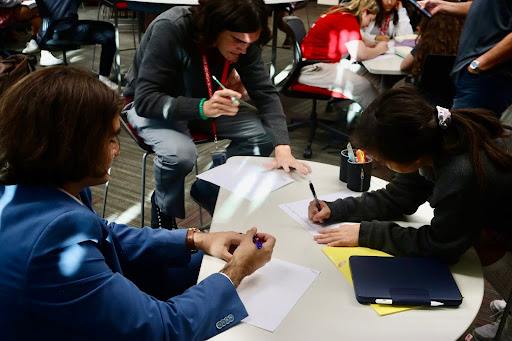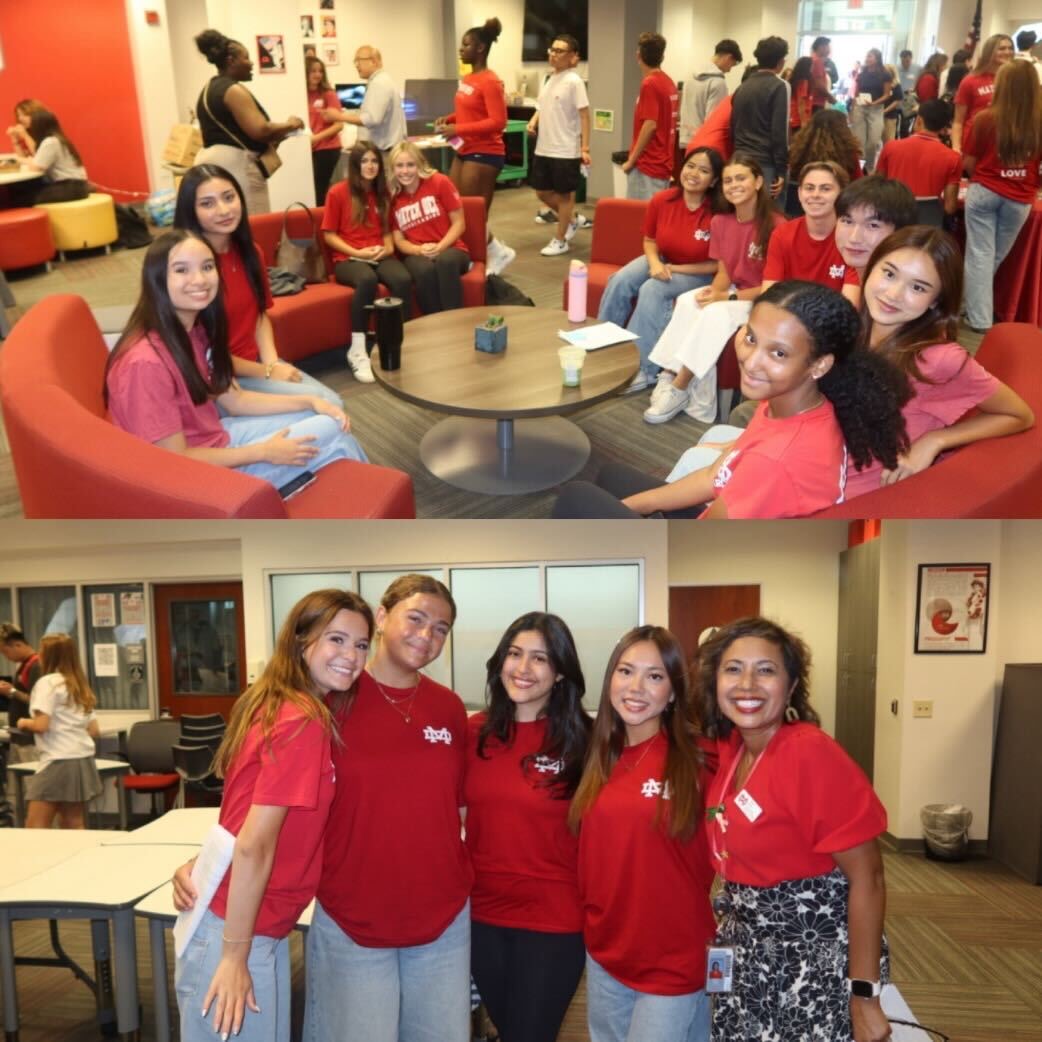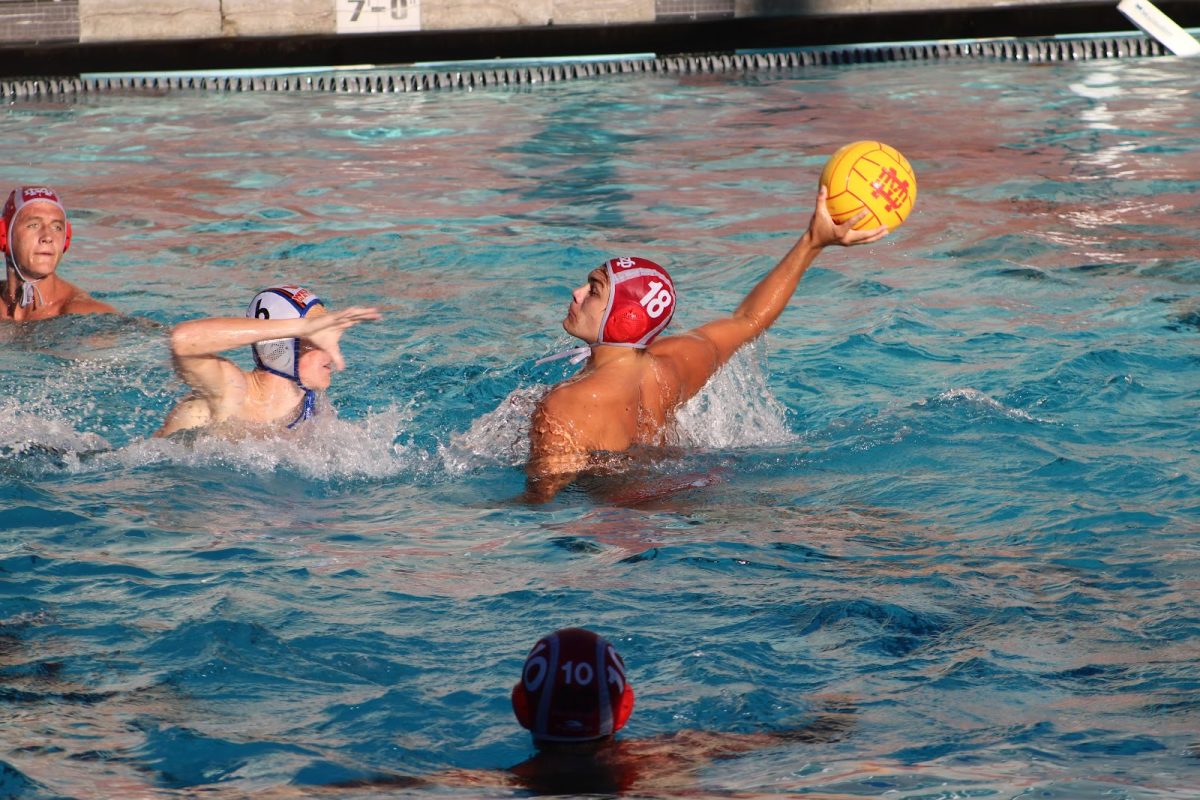First place in division one, the top team in the county, and one of the best teams in Southern California are just a few of the phrases used to describe Mater Dei’s fierce and skilled athletics as they dominate the region. These characteristics also describe another side of competition at Mater Dei, the competitive teams of Mock Trial, Academic Decathlon, and Model United Nations. These teams are just as skilled and talented as the athletic teams on the opposite side of the spectrum, but they are less well known in comparison.
Academic teams are engaging and educational opportunities for students that strive to excel beyond the classroom. Mock Trial, Academic Decathlon, and Model United Nations specifically have many similarities focusing on utilizing students’ intelligence and quick thinking skills in competition. Many students involve themselves in academic teams for reasons ranging from attempts at forming friendships, spicing up their resumes, or to fulfill interests they have. Senior Victoria Cox is Mock Trial’s current Co-Team Captain, and she has seen the benefits first hand.
“Mock Trial has allowed me to meet such cool, fun, [and] interesting people,” Cox said. I’ve made a lot of really great friends the past couple of years.”
Academic teams are open to all students regardless of GPA, academic level, or level of confidence. All three teams have space for any kind of student and open their doors to anyone who is interested. Senior, Mock Trial and Model UN team member, Lucas Cruz believes this is a common misconception among outsiders.
“The biggest misconception is that you have to be super smart to do it, but you can really just try it out at any level,” Cruz said. “You’ll find something that fits you, and it will be so much fun.”
Mock Trial is a civic education program that combines performance based, law related education with tournament style competition. Mock Trial introduces students both to the civic progress within the country and the skills students need to excel within it.
“If you’re interested in law or even just public speaking, it’s a very good experience,” Cox said. “It forces you out of your comfort zone and allows you to essentially push yourself into becoming a better speaker.”
These skills help students not just excel in the future, but in the current competitions. The main tournament style competition Mock Trial competes in is the Constitutional Rights Foundation’s (CRF) Orange County tournament. Like most other teams, you must try out for Mater Dei’s Mock Trial. This helps sort students within two team levels, Varsity and Junior Varsity, and four separate sides of two defense teams and two prosecution teams.
“The way that Mock Trial is structured is so specific to its competition,” Cox said. “We’re separated into prosecution and defense teams, and the prosecution argues for the prosecution of the defendant while the defense is trying to prove their innocence.”
Mock Trial at Mater Dei is extremely competitive both within its own team and the county as a whole. The team members must earn their spots on their respective levels, and even further compete for their personal roles. Mater Dei is one of the best teams in Orange County, earning a top 16 spot in CRF’s 2023 tournament, and earning third place in the annual JSerra competition.
“There’s definitely strong competition and competitiveness between everyone,” Cruz said. “Because you want to win, you want to be the best, and for Mock Trial you want to be able to win CRF.”
Model United Nations is another form of unique academic competition that represents what the official United Nations does, but on a student level. It allows the students to learn life skills such as problem solving and communication that can be used in almost any future career. MUN Program Adviser Charisse Kitsinis works directly with students across all grade levels.
“[Students] have to work with all the other countries to try to find a resolution to whatever the topic is, it’s a great way to build all kinds of different skills, learn about global issues, and most importantly develop diplomatic skills,” Kitsinis said. “So people really work together very well to build a resolution.“
MUN also has its own team levels– varsity and a normal team with less commitment. These two teams allow students with all different abilities and interests to still be involved within the program. It builds up a competitive aspect within the team and against numerous schools.
“We do have a varsity team here at Mater Dei, and we compete at more events than our normal team does,” Cruz said. “The competitions are us going to other high schools, competing with their students, and winning awards.”
One thing that allows MUN to stick out among other academic teams is the opportunity to travel. MUN does not just compete within the county, but competes around the world internationally in a number of countries. They take several students each year to unique countries across the world to compete in a conference, as well as learn more about the country they visit.
“Model United Nations is also a really great way to become well traveled as they go on a trip every single year,” Cruz said. “This year we are going to Greece, and it’s just a really awesome way to see more of the world, experience that culture, and be able to talk to people from all over.”
Academic Decathlon is the final team touched on in this article. It is a nationwide program that gives students the opportunity to compete in ten unique academic areas: mathematics, science, language and literature, economics, social science, music, art, essay, speech, and interview. This allows students to delve deeper into some of their academic interests, becoming experts in the field in order to compete in the annual Super Quiz, the yearly Academic Decathlon Competition.
“Academic Decathlon is split into 10 different events. We have seven events that are based on tests,” Cox said. “So we’re given a topic that we have to study multiple topics within throughout the year.” “We have a speech event, we have an essay event, and we have the interview [event].”
Academic Decathlon opens its doors to a multitude of unique students coming from all academic backgrounds. Their team levels allow for competition with students of all GPA levels, pushing students to do their personal best.
“Team levels are separated by [a uniquely calculated] GPA category. So for Honors, it’s 3.8 to 4.0 GPA, for Scholastic, it’s 3.2 to 3.79 and for varsity, it’s 3.19 to zero,” Cox said. “Decathlon doesn’t just want the smartest people [who have] the best grades. They want smart people who also might not have the best grades.”
Mater Dei’s team is one of the most competitive teams around, receiving commendations such as second place in the SoCal Private School Region, first place in the Super Quiz, and first place in division one. This is due to their hard work and teamwork allowing them to excel each year.
“For decathlon, we’re always striving to do better than we did last year,” Cox said. “There’s regional and state competitions, and every year we try to make it to state and [attempt to] get first in the regionals. Last year, we got second in the regionals.”
The success of these teams is not always touted as publicly as athletics often is, but the teams are some of the best within the county and in some cases even the state. Students get to truly be part of a team, and build relationships with those around them. These academic teams add another benefit to a student’s educational experience at Mater Dei, offering something that would not be possible without these teams.
“Students should be involved in academic teams because they’re very enriching, and they’re not just another way to study like you might think,” Cox said. “It’s more about you learning to bond with other people, while also like gaining knowledge on something that you might have not even known, or knew you were going to study.”









![PUTTING IN OVERTIME: Student wrestlers participate in scrimmage matches during practice. The Mater Dei Wrestling Team puts a lot of time and effort into training for matches. “I practice every day,” Gomez said. “We train for three hours and then [a] two hour lift.”](https://thescarletscroll.com/wp-content/uploads/2025/09/wrestling.jpg)
![SETTING THE STANDARD: Mater Dei High School and Playfly Sports announced its historic media partnership in the spring of 2025. As Mater Dei Athletics continues to achieve new heights, Playfly will introduce new partnerships and sponsors for these programs. With the added revenue and resources, Mater Dei can improve the high school experience for all students, while engaging the community in a showcase of Monarch pride. “[This partnership is designed] to increase the experience that our athletes and our non-student athletes have with the [athletic] programs,” Melvin said. “School spirit, engagement, and pride are all things we [keep in mind].” Photo taken by Kenzington Ragge.](https://thescarletscroll.com/wp-content/uploads/2025/09/IMG_0237.jpeg)